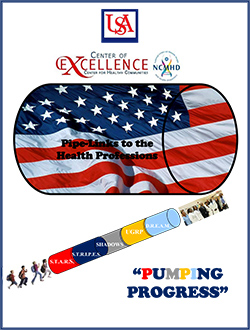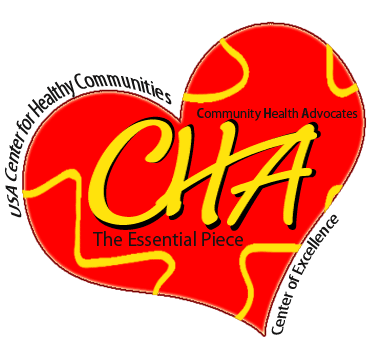USA Center for Healthy Communities Outreach
Community Outreach is a Core function of the Center for Healthy Communities (CHC). The community outreach initiatives of CHC include both health promotion and disease prevention activities. The Outreach Core uses community-based participatory approaches that engage various sectors of the population as active partners in its efforts to improve the overall health of the target communities. The community health advocate (CHA) program and Pipeline programs support the development of future healthcare providers and researchers and are both active programs of this division of CHC. Through the efforts of this division the Center actively contributes to the NIMHD goals of:
- Establishing novel effective partnerships with organizations and communities for conducting original and innovative cutting-edge research leading to improvements in minority health, the elimination of health disparities, or both; and
- Establishing, enhancing or strengthening community engagement/outreach and institutional partnerships for improving minority health and the health of health disparity populations.
 MISSION: To actively involve high potential minority students in science, research
and training to promote awareness of health disparity and to create a support system
that facilitates college readiness and interest in pursuing healthcare careers
MISSION: To actively involve high potential minority students in science, research
and training to promote awareness of health disparity and to create a support system
that facilitates college readiness and interest in pursuing healthcare careers
The University of South Alabama Center for Healthy Communities Center of Excellence (COE) sponsors Pipe-Line Programs to encourage minority students from underserved communities to enter career paths already committed to the reduction of health disparities.
African Americans, Hispanics, and other minority groups are significantly underrepresented in the field of biomedical research. This disparity is even more evident among the research-based faculty of universities, non-profit institutions, and commercial research entities than it is for practicing physicians, nurses, and dentists. To address this disparity, the Center of Excellence has developed a research education link aimed at enhancing the research experience and skills of early career African American and Hispanic biomedical researchers. This program is the Undergraduate Research Program (UGRP).
A second means of addressing the disparities is to develop a new generation of healthcare providers through the Academic Pipe-Line. This Pipe-line links two separate but complementary programs: S.T.A.R.S. (Student Training for Academic Reinforcement in the Sciences) and S.T.R.I.P.E.S. (Special Training to Raise Interest and Prepare for Entry into the Sciences). The MISSION of the S.T.A.R.S. and S.T.R.I.P.E.S. Program is: to engage gifted minority students in science, research and training to promote awareness of health disparity and to create a support system that facilitates college readiness and interest in pursuing careers in the health sciences. These programs are aimed at younger potential scientists. S.T.A.R.S. targets rising high school juniors and S.T.R.I.P.E.S. targets rising high school seniors. The Program includes four-week and six-week academic enrichment sessions conducted over consecutive summers (designated Phases I and II), respectively, and is aimed at advancing their knowledge-base in the sciences through active team-based learning. One of the goals is to develop skills in critical reading, thinking, and analysis in preparation for college pre-health pursuits.
The last phase, (Phase III), in the high school academic pipeline is SHADOWS. This level provides an opportunity for students who have successfully completed S.T.A.R.S and S.T.R.I.P.E.S. to experience daily activities in a healthcare facility. Additionally, they are required to submit college applications, complete with financial aid, and conduct an exhaustive scholarship search prior to the end of this phase. These students earn a stipend while working a twenty-hour work week over a six week period.
Read articles about activities of the Pipe-Line Programs. For more information about the PIPE-LINE Programs please contact Ms. Mary Williams.
Applications
Applications are due February 28. For applications that can be completed digitally, please contact Mary Carmen Williams, Community Outreach Coordinator. Please do not submit handwritten applications.
What is a Community Health Advocate?
 A Community Health Advocate (CHA) is
A Community Health Advocate (CHA) is
- a motivated, concerned individual who seeks to improve the overall health of his or her community
- a person who may focus on health broadly or may choose to identify a specific health issue to champion
- a person whose strength comes from her having roots in the community and whose relationships with friends, family, co-workers, and neighbors can help bridge the gap between community members and healthcare professionals
- someone with the skills, dedication, sincerity, and concern to effectively motivate her fellow community members to improve their health by coupling clear, positive communication with accurate health information
Who can become a CHA?
- anyone who wants to become a CHA can apply to do so
- anyone who is willing to participate in training* and commit to serving for one year
*participants will never be required to pay for any aspect of the training, participants will not be required to obtain certifications or special credentials, time commitments will be kept as reasonable and flexible as possible.
What can I expect if I become a CHA?
- In addition to becoming champions of health, CHA’s experience a unique opportunity to become involved in community based participatory research(CBPR). The Center staff is equally interested in developing our CHAs confidence and competency in health disparities as we are in conducting the research to improve access and equity in care.
- CHAs are also offered opportunities throughout the year to attend regional and local meetings and gain professional CEUs as well as other training opportunities
- Participation in the CHA program is completely voluntary. We only ask that CHAs keep us abreast of any programs they wish to plan so that we can provide support and gain feedback on their program.
Overall Goals of the CHA Program
- To achieve better health status
- To make a difference
- To promote healthier lifestyles
- To help those in need
- To discover and promote community resources
- To break down barriers
- To bring health innovations to families
- To eliminate health disparities
- To make an impact in the community
- To educate one another
Read articles about CHA activities.


